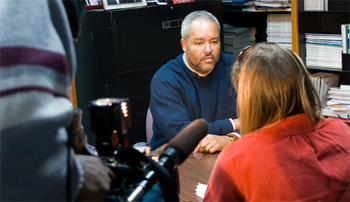 |
Rubens Pamies, M.D., talks with the media on Wednesday regarding the earthquake that devastated Haiti. Dr. Pamies is from Haiti and as of Wednesday afternoon he was still awaiting word about the safety of some of his family members there. (Andrew E. Nelson, UNMC public relations) |
“On a good day, you can’t reach people in Haiti. But, with something like this … it’s almost impossible,” said Rubens Pamies, M.D., UNMC vice chancellor for academic affairs and a native of Haiti, after the island nation was struck by a magnitude 7.0 earthquake on Tuesday.
Officials fear hundreds of thousands may have died as a result of the quake.
As of Wednesday afternoon, Dr. Pamies and his wife, Michelle, still hadn’t heard news about several family members who live in Haiti.
He did receive word Tuesday that his sister, Linda, was safe. The conditions of some of his aunts and cousins, however, remained a mystery.
|
Its residents have endured political unrest, violence and hurricanes, but the earthquake took the entire country by surprise, Dr. Pamies said.
On Wednesday, Chancellor Harold M. Maurer, M.D, Dr. Pamies and other UNMC officials urged employees and others to donate to aid organizations to support Haiti.
Dr. Maurer appointed Dr. Pamies and Ayman El-Mohandes, M.B.B.Ch., M.D., M.P.H., dean of UNMC’s College of Public Health, to coordinate medical center efforts to respond to the disaster.
“The dimension of this disaster promises to become a global public health priority. Emergency responsiveness locally is a template for what the world can expect in challenges on a wider geographic scale,” Dr. El-Mohandes said. “The implications are important to the world … not only in the context of humanitarian priorities and displaced populations due to environmental and economic challenges, but also disease control and stabilization of communities and ecosystems.
“We must do what we can to provide assistance!”